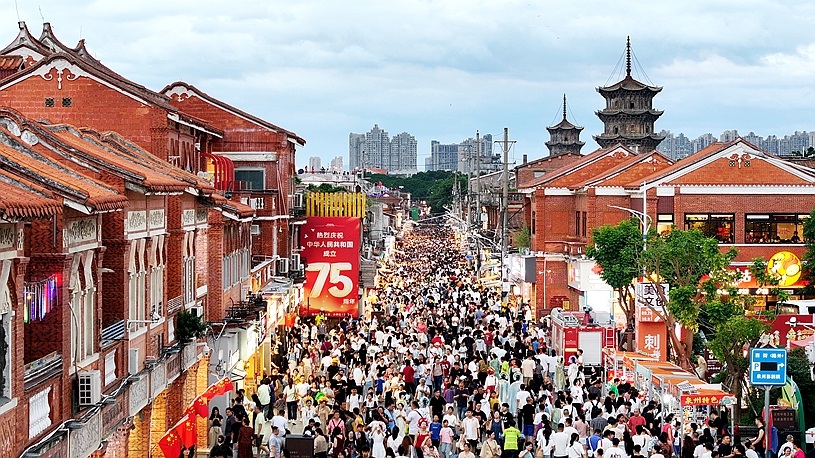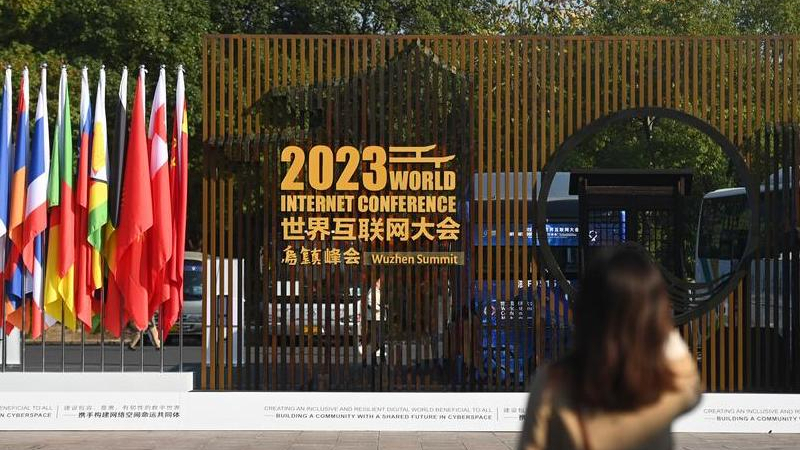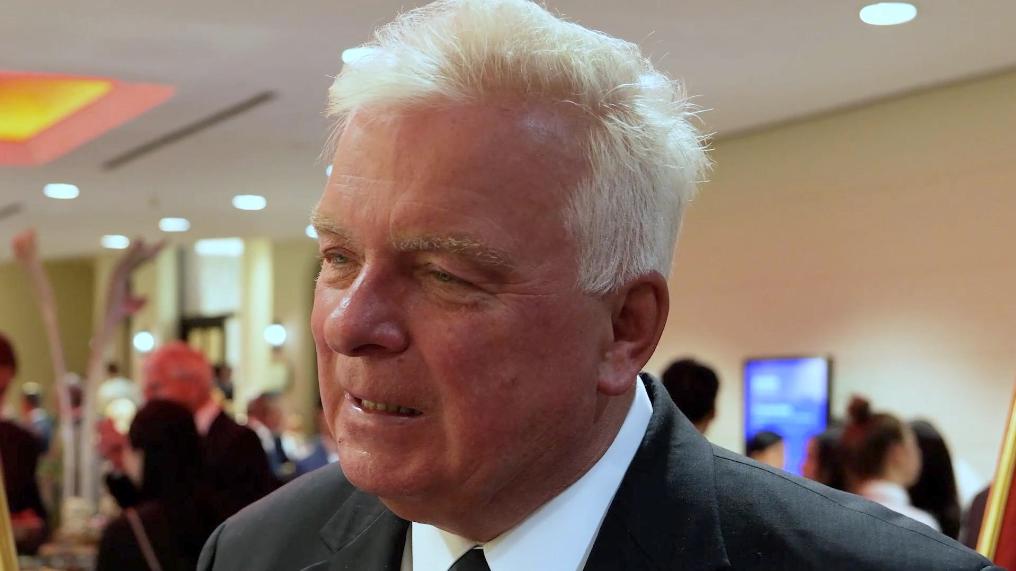BEIJING, Oct. 6 (Xinhua) -- Mohan, a small town in the southernmost part of southwest China's Yunnan Province, reached a trade milestone last month, with over 10 million tonnes of freight, including fresh fruits, coffee, air conditioners and new-energy vehicles, transported on the China-Laos Railway over the previous three years.
Since the launch of the 1,035 km rail line in December 2021, Mohan has become an important transport hub with significant highway and railway ports. Also, it's the only national-level land port linking China and Laos, with new development opportunities mushrooming.
The story of Mohan is a telling example of China's unwavering high-level opening-up. Since the founding of the People's Republic of China 75 years ago, China has achieved leapfrog development in opening wider to the world.
Confident that opening-up is the right path, China has been implementing proactive strategies, including spurring trade growth, attracting foreign investment and expanding institutional opening-up, to accelerate cultivating new international competitive advantages and achieving mutual benefits with other countries.
BOLSTERING FOREIGN TRADE, INVESTMENT
In 1950, China's foreign trade in goods was only 1.1 billion U.S. dollars, accounting for 0.9 percent of the world's total. By 2023, China's total goods trade had reached 5.9 trillion U.S. dollars, accounting for 12.4 percent of the global share, and has consistently ranked first in the world for seven consecutive years.
Service trade has also undergone tremendous expansion. When the People's Republic of China was founded, the country's service trade was almost zero. While in 2023, China's total service trade import and export volume reached 933.1 billion U.S. dollars, ranking fourth in the world.
The country is actively expanding imports to share market opportunities with the rest of the world. In 2023, China's import sources have covered over 200 countries and regions. The China International Import Expo (CIIE), the world's first national-level import-themed expo, has been held for six consecutive years.
"China should continue to offer new opportunities nurtured from its vast market to other countries by holding international fairs such as the CIIE, the China International Consumer Products Expo and the Global Digital Trade Expo," said Ma Xiangdong, a professor at the Party School of the Communist Party of China of Beijing Municipal Committee.
Continuous efforts have been made on lowering tariffs. China's overall tariff level has been reduced to 7.3 percent, approaching the average level of developed countries. The country recently announced a move to give all the least developed countries that have diplomatic relations with China zero-tariff treatment for 100 percent tariff lines starting from Dec. 1 of this year.
China has built 22 pilot free-trade zones, covering coastal, inland and border areas, contributing about 20 percent of the total foreign investment and import-export volume of the country.
The country also keeps expanding its "friend circle" globally. By the end of 2023, China had signed 22 free-trade agreements with 29 countries and regions, and it had signed over 200 Belt and Road cooperation documents with over 150 countries and over 30 international organizations.
At the same time, foreign investment has been encouraged. The country's negative list for foreign investment had been shortened for five consecutive years from 2017 to 2021, and laws and regulations, including the Foreign Investment Law, were put into force to step up protection for foreign investors.
In 2023, China's foreign direct investment, in actual use, reached 163.3 billion U.S. dollars, an increase of 176 times compared to 920 million U.S. dollars in 1983, maintaining its world-leading position in terms of scale for multiple consecutive years.
China's investment is playing an increasingly prominent role in promoting economic development worldwide. In 2023, China's non-financial outbound direct investment reached 130.1 billion U.S. dollars, an increase of 61 times on that of 2003, and ranking third worldwide for 11 consecutive years.
PROPELLING INSTITUTIONAL OPENING-UP
China has been unswervingly expanding institutional opening-up in recent decades to realize high-quality development and offer the world new growth momentum and opportunities, rolling out various policies.
In the latest move of this kind, China announced in September that it would allow the establishment of wholly foreign-owned hospitals in certain cities and regions, including Beijing, Tianjin, Shanghai, Nanjing, Suzhou, Fuzhou, Guangzhou, Shenzhen and throughout the island of Hainan.
In the same month, the country issued the 2024 version of the negative list for foreign investment access, reducing the number of restrictions from 31 to 29 and achieving zero restrictions on the manufacturing sector.
This fully demonstrates China's active willingness to expand mutual benefits and a clear attitude to supporting economic globalization, said Jin Xiandong, an official with the National Development and Reform Commission, adding that further efforts will be made to improve the level of foreign investment liberalization and facilitation, and to optimize service for foreign-invested enterprises.
At its third plenum, the 20th Central Committee of the Communist Party of China renewed the country's commitment to the basic state policy of opening to the outside world and continuing to promote reform through opening up.
"Leveraging the strengths of China's enormous market, we will enhance our capacity for opening up while expanding international cooperation and develop new institutions for a higher-standard open economy," reads a resolution adopted at the plenum.
Opening up to the outside world is not just a matter of "opening the door", but more importantly, is actively aligning with international economic and trade regulations as well as other high-standard rules, said Zhang Bin, deputy director of the Institute of World Economics and Politics at the Chinese Academy of Social Sciences.
Zhang underlined the need to enhance synergy between the domestic and international markets as well as resources to constantly cultivate and consolidate new advantages in international economic cooperation and competition. ■












